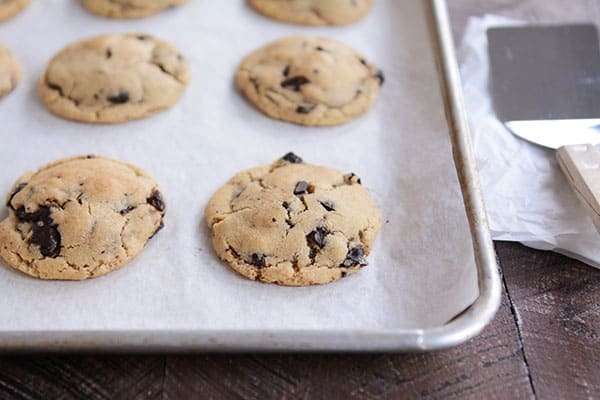
4.8 from 516 votes
Soft and Chewy Chocolate Chip {or Chocolate Chunk} Cookies
Whether you're entertaining or relaxing, this recipe hits the spot.
Prep Time
15 mins
Cook Time
15 mins
Total Time
25 mins
Servings: 36 Cookies
Course:
Dessert
Cuisine:
American
Ingredients
- 1 cup salted butter softened to cool room temperature (not overly warm or melty)
- 1 cup granulated sugar
- 1 cup brown sugar light or dark
- 2 teaspoons vanilla extract
- ¾ teaspoon salt
- 1 teaspoon baking soda
- ½ teaspoon baking powder
- 1 large egg
- 2 ½ cups all-purpose flour (see note)
- 2 cups semisweet (or milk) chocolate chips or chocolate chunks
Instructions
- Preheat the oven to 350 degrees F (see note about convection). Line two baking sheets with parchment paper or silicone liners.
- In the bowl of a stand mixer fitted with the paddle attachment or in a bowl using a handheld electric mixer, combine the butter, granulated sugar, brown sugar, vanilla, salt, baking soda, and baking powder.
- Mix on low speed to combine. Increase the speed to medium and mix for 4-5 minutes until the mixture is light and creamy, scraping the sides of the bowl as needed.
- Add the egg and mix until evenly combined.
- Add the flour and the chocolate chips (or chocolate chunks) and mix until combined and no dry streaks remain.
- Scoop the cookie dough into rounded balls (about 2 tablespoons in size; I use my #40 cookie scoop), spacing them an inch or so apart on the prepared baking sheets.
- Bake for 9-11 minutes until just very lightly golden (or no color at all) and set around the edges. Let cool for a few minutes on the baking sheet before moving to a wire rack to cool completely. Repeat with remaining cookie dough.
Cup of Yum
Notes
- Flour Tips: if you like your cookies slightly more puffy, use 2 3/4 cups (13.75 ounces) all-purpose flour. Speaking of flour, despite the best-written cookie recipe, people can still get varying results when baking. If you find your cookies are flattening or spreading too much in the oven, it could be due to the way you and I measure flour, elevation differences, or oven temperature differences.
- One Cookie Experiment: sometimes, while it seems a little tedious, baking one cookie to start will give you a chance to alter a factor that could help. Try adding a couple more tablespoons flour to the cookie dough if this happens OR increasing the oven temperature by 25 degrees OR baking on convection (if you have it). You can consult this quick Instagram experiment I did a while back for a few more details.
- Puffy Cookies: if your cookies are baking too puffy and not spreading well, it's most likely due to overflouring the dough (and on this note, it's always better to underflour than overflour because adding flour is obviously easier than taking it out). My quick hacks to "fix" puffy cookies are 1) lowering the oven temp by 25 degrees and/or 2) using the bottom of a flat-bottomed drinking glass to lightly press the cookies flat after they come out of the oven (similar to this recipe).
Nutrition Information
Serving
1 Cookie
Calories
182kcal
(9%)
Carbohydrates
23g
(8%)
Protein
2g
(4%)
Fat
9g
(14%)
Saturated Fat
5g
(25%)
Cholesterol
19mg
(6%)
Sodium
134mg
(6%)
Fiber
1g
(4%)
Sugar
15g
(30%)
Nutrition Facts
Serving: 36Cookies
Amount Per Serving
Calories
% Daily Value*
| Serving | 1 Cookie | |
| Calories | 182kcal | 9% |
| Carbohydrates | 23g | 8% |
| Protein | 2g | 4% |
| Fat | 9g | 14% |
| Saturated Fat | 5g | 25% |
| Cholesterol | 19mg | 6% |
| Sodium | 134mg | 6% |
| Fiber | 1g | 4% |
| Sugar | 15g | 30% |
* Percent Daily Values are based on a 2,000 calorie diet.